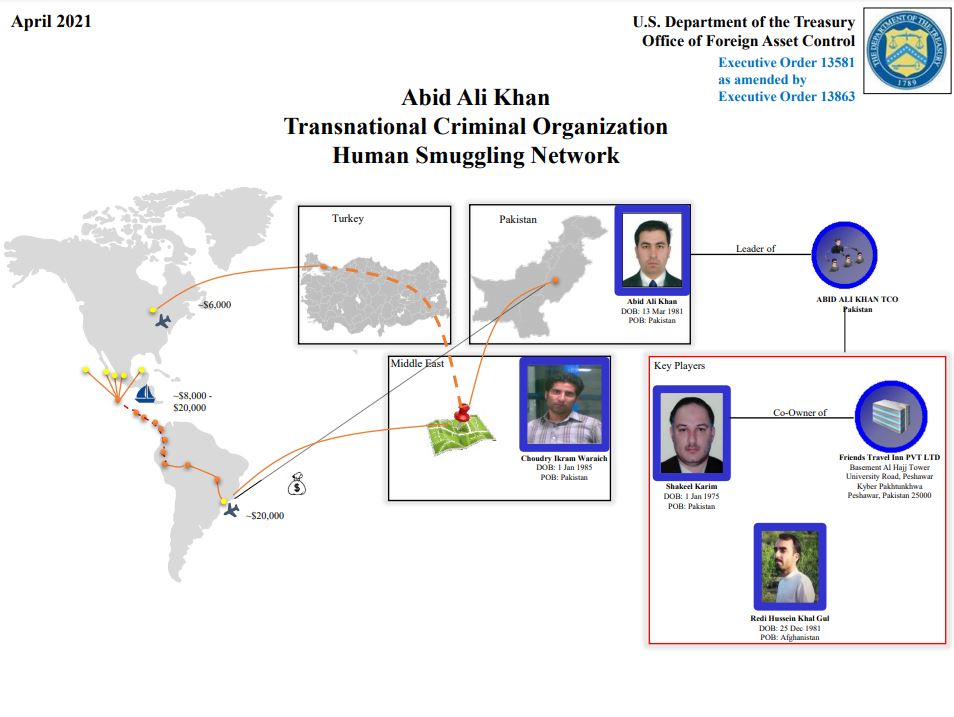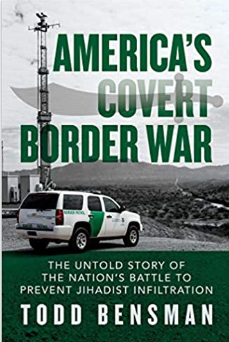
Biden Administration action suggests heightened urgency to reduce a terror travel threat at the border. The reward for Abid Ali Khan’s capture comes amid an Afghanistan refugee crisis and national media reporting that historically large numbers of international migrants from around the world are on their way to the southern border through the Darien Gap jungle route Khan uses.
By Todd Bensman as originally published October 14 by the Center for Immigration Studies
In a rare public national security move coinciding with a collapsing southern border and the chaotic fall of Afghanistan, the US State Department has offered $2 million in reward money for information leading to the arrest of a fugitive Pakistani human smuggler and financial disruption of a network that transports Afghans, Pakistanis and Middle Easterners through the currently packed Colombia-Panama “Darien Gap” to the American frontier.
The State Department reward for the capture of Abid Ali Khan and disruption of his organization comes amid an Afghanistan refugee crisis and national media reporting that historically large numbers of international migrants from around the world – 95,000 in just the first nine months of the Biden administration – are on their way to the southern border through the Darien Gap jungle route Khan uses.
A typical Khan tactic is to disguise his Afghan and Pakistani clients as foreign nationals of other countries and using false identity documents as they are transported by air to Brazil and then overland through Central America and Mexico for an average of $20,000 per person, the American government alleges.

It should come as no surprise that American authorities would choose now to offer such a large and rare reward for this human smuggler of a category of higher national security risk travelers often called “special interest aliens.” These migrants are from countries with Islamic terrorist organizations such as Afghanistan and next-door Pakistan, to which untold hundreds of thousands of Afghan refugees are now fleeing the Taliban.
The Center for Immigration Studies recently reported that Afghans are routinely smuggled through the gap to the southern border and predicted an increase following the August fall of Kabul to the Taliban and refugee flight to neighboring countries like Pakistan, where smugglers like Khan would offer travel packages to the US border.
What the Khan smuggling case is about
As CIS also reported in April, federal prosecutors indicted Khan after a lengthy Miami-based ICE Homeland Security Investigations investigation. The April 7 indictment alleged that, since at least 2015, Khan operated his international smuggling network from Nowshera, Pakistan, which is known as a troubled center of violent Islamic militancy.
The Department of Justice indictment against Khan was issued in absentia with an unfulfilled arrest warrant, and none of his associates have been arrested either. So in addition to the indictment, US authorities mounted a rare secondary move against the Khan smuggling network this Spring that indicates its high place as a homeland security threat priority.
The Treasury Department’s Office of Foreign Assets Control (OFAC) designated Khan and three others in his network, one Afghan and two other Pakistanis, as a Transnational Criminal Organization (TCO).

The designation opens the door for US government operations to disrupt Khan’s finances and isolate him and his subordinates from most financial dealings. OFAC designations are rarely, if ever, used against smuggling networks like this, which stands as an indication of the danger with which US homeland security viewed the Khan network as the border crisis was ramping up in April.
The State Department reward announcement does not mention terrorism, national security, the fall of Kabul or the historic Darien Gap surge, although it does say organizations like Khan’s “pose high risk.” But various government announcements about the Khan network do indicate reason for its high priority.
Miami Homeland Security Investigations Special Agent in Charge Anthony Salisbury noted in one April government press release that the Khan network transported “people with nefarious motivations” into the United States. And while Salisbury did not elaborate, he reiterated that his Miami team was committed to prosecuting individuals like Khan who “pose a threat to national security”.
Likewise, Acting Assistant Attorney General Nicholas L. McQuaid of the Justice Department’s Criminal Division, noted in a Treasury Department statement that the government moves sought to prosecute Khan and smugglers like him “who seek to profit from … jeopardizing our national security.”
A national security threat at the southern border during a mass migration crisis
The failure to elaborate much more on the terrorism threat is not surprising, probably to avoid politicization at a time of historic levels of illegal immigration over the southern border.
Rarely does the homeland security establishment acknowledge when suspected terrorists are smuggled over the border, although my book, America’s Covert Border War, the Untold Story of the Nation’s Battle to Prevent Jihadist Infiltration, provides extensive details about the many who have been caught.

In a surprise departure from that tradition, however, on April 5 U.S. Customs and Border Protection issued a fairly detailed press release acknowledging the separate January and March apprehensions of two Yemenis who were already on the FBI’s terrorism watch list when they were apprehended near Calexico, Calif.
CBP removed the document the next day after many on social media began citing it as evidence of a national security threat inherent in the current border crisis. CBP told CIS it had not gone through proper “review”, but did not disavow its accuracy. (An intelligence community source with direct knowledge of the cases told CIS the release was accurate.)
Announcements of U.S. government action against the Khan organization came only a day later, going largely unreported by U.S. media.